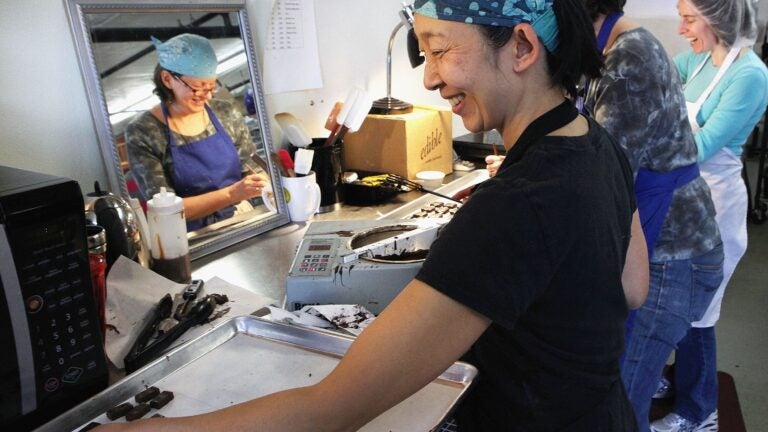Readers Say
“It’s one of my best childhood memories, gathered around the table eating and sharing stories.”
There are many places in Greater Boston that can feel like a sanctuary for the Asian American and Pacific Islander community. Whether it’s finding a sense of belonging in places like Boston’s Chinatown or enclaves in Lowell, connecting over favorite dishes like bao at Eldo Cake House, taking part in a family tradition, or even creating a work of art, there are always ways to relate to your Asian roots.
In honor of AAPI Heritage Month, we asked readers to share how they ground themselves in their Asian culture. Food was a major theme that you mentioned, especially when families come together. Readers also mentioned creative activities, like dance or painting.
Ahead, we’ve included some of the top reader responses on what keeps you tied to your Asian roots.
Responses have been lightly edited for clarity.
‘We get together to make a traditional Filipino breakfast’
“Sunday brunch with my family! When we can, we get together to make a traditional Filipino breakfast that consists of Filipino breakfast sausage called longanisa, tuyo, which is a type of fried fish, garlic fried rice, and a sunny side up egg. This is all served with a spicy vinegar. It’s one of my best childhood memories, gathered around the table eating and sharing stories.”
—Frances M., Westford
‘Potlucks with Indian American friends’
“Potlucks with Indian American friends—cooking, and then eating variety of Indian dishes, watching cricket games, and celebrating festivals like Diwali and Holi together is fun. My son goes to culture and language school every Sunday so that he can also learn and stay connected to our Indian roots and culture.”
—Aditi S., Westford
‘My family would head into Chinatown to visit friends’
“Having a meal and going food shopping in Boston’s Chinatown raises so many family memories for me. While I was born in New York City, every weekend wherever we lived—whether Philadelphia or New Jersey—my family would head into Chinatown to visit friends, eat a meal and do our weekly grocery shopping. Like Chinatowns across the country, you could literally purchase anything—designer knock-off clothing, dishes, furniture, electronics, and legal or translation services.”
“As a clinical social worker, working for places like Catholic Charities, my mother often volunteered in the NYC and Philadelphia Chinatowns. Mom was highly successful as a friendly Asian face who spoke Shanghainese and a little Mandarin. Yet, it could be challenging to gain the trust of some Chinese people, even though they desperately needed her help. She was an ‘unknown,’ spoke a different dialect, and they worried she would report them to the authorities. When I was a child, she would bring me along to help break the ice and gain their trust. I would play with the other kids until it was time to leave. It was fun for me!”
“In helping to bring the documentary, A Tale of Three Chinatowns to GBH WORLD Channel, I am saddened to learn so many Chinatowns—these havens of familiar language, culture, food and services—are losing ground building by building. Boston Chinatown and other enclaves like Boston Little Saigon and Cambodia Town in Lowell are essential, important places that respect and preserve unique cultures while providing services to the newest among us. We all, not just fellow AAPI, need to support and help these enclaves flourish.”
‘A full box of baked char siu bao and egg tarts from Eldo Cake House’
“When we were kids, my Por Por (grandmother) would bring a full box of baked char siu bao and egg tarts from Eldo Cake House whenever she visited. They still remind me and make me feel connected to her.”
—Amanda G., Dracut
‘My mom’s homemade Chinese food’
“Celebrating Chinese New Year every February, eating my mom’s homemade Chinese food, and speaking Mandarin Chinese at home helps me identify with my Asian background. It signifies another identity with my American one.”
—Jesse L., New York (originally from Boston)
‘Watching movies and television shows with Asian Americans in them’
“Watching movies and television shows with Asian Americans in them, playing real-life roles and not tired stereotypes. Makes me feel seen and heard, and valued.”
—Jeff L., Hingham
‘I love dancing knowing I’m sharing my culture with others’
“As a Cambodian American, I’ve found myself connecting with my heritage culture through the form of dance. In the last few months, I’ve had the honor to learn…the Coconut Dance, also known as Robam Kous Troloak, with UML CASA (UMass Lowell, Cambodian American Student Association). It has been so fun to learn a piece of my culture alongside friends. We’ve been asked to perform so many times, and our list of performances just keeps growing. I love dancing knowing I’m sharing my culture with others in this fun, flirtatious courting dance!”
—Erika K.
‘I wrote a song…about my experience as a mixed Asian person’
“For me as a mixed Japanese person, finding a connection with my Asian side has always been challenging, but very rewarding. I don’t speak Japanese and have never been to Japan, though I would really love to someday. … Two things that have brought me closer to my Asian heritage are: food and music. I already ate a lot of Japanese food growing up, but have made it as point as an adult to cook a lot of Asian food. It is not only delicious but also helps me feel that connection with my heritage. I can make a mean chicken teriyaki, and when I give my friends the recipe I urge them to marinate overnight and make their own sauce; otherwise it’s just not the same. I didn’t grow up knowing my Japanese grandmother unfortunately, but part of me likes to think that if she were living, she and I would’ve enjoyed cooking cultural foods together.”
“As for music, I am a singer-songwriter who has always felt comfortable writing about personal events and emotions but until recently did not feel like I could talk about racial identity in my music. … I wrote a song called “Where Are You Really From?” about my experience as a mixed Asian person, particularly as an Asian woman. It talks about experiences of fetishization and your classic micro-aggression, “Okay, but where are you really from?” It’s available on streaming services if you’d like to hear more! It really helped me go finally write down these thoughts and feelings I had been having for so many years surrounding my racial identity, and some of my other mixed Asian friends really related to it too, which made it even more special.
‘As a singer and songwriter, I write about our history’
“I was born in Hong Kong, and lived in an orphanage for two years, then was adopted and raised here in the U.S. As a singer and songwriter, I write about our history here in America and our Asian American identity.”
—Mae S.
‘Chinese brush painting and calligraphy’
“Food, paper folding, and Chinese brush painting and calligraphy.”
—Hui, Northborough
Newsletter Signup
Stay up to date on all the latest news from Boston.com









